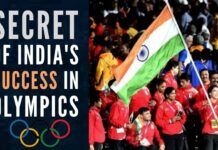
[dropcap color=”#008040″ boxed=”yes” boxed_radius=”8px” class=”” id=””]P[/dropcap]at Riley, the legendary basketball coach of Los Angeles Lakers famously coined the phrase – “In sports there is winning and misery”. Many NBA (National Basketball Association) basketball teams now refer to it as the Riley doctrine. Judging India’s performance at the just concluded Rio Olympics by this principle, it was indeed misery for athletes as well as for the 125 crore citizens who wholeheartedly cheered for them. Expectations were set at 10-12 medals before the start but at the end, India had just two medals to showcase – silver in badminton and bronze in wrestling.
It has become a ritual after every Olympics for commentators and experts to blame the Government and Sports Ministry for such poor performance. And, there is a hue and cry for shutting down the Sports Ministry and its arm Sports Authority of India (SAI). Even the Prime Minister took note of the poor performance and announced a Task Force to prepare India for the next three Olympics starting with the 2020 Tokyo Olympics. But can a government Task Force deliver an action plan that can produce medal winners?
If India gets its sports policy and management right in the next few years, it can expect to blossom at the 2028 Olympics.
Winning medals has come to signify soft power of a country and hence it has become a priority for many countries to showcase their athletic prowess on world stage and enhance its international prestige. Just like the Modi Government, many governments have created Task Forces to improve their medal tally in Olympics. Except for Great Britain, other countries have not succeeded in their endeavor despite pouring millions of dollars to make their nations an Olympic powerhouse.
[dropcap color=”#008040″ boxed=”yes” boxed_radius=”8px” class=”” id=””]T[/dropcap]he National Lottery system that funds majority of Great Britain’s Olympic athletes has earned accolades for the country’s performance in the last two Olympics. After a dismal performance in the 1996 Atlanta Olympics where it only won one gold medal and was placed 36th amongst nations, Great Britain now stands tall with third and second place finish in the medal tally at the 2012 London and 2016 Rio Olympics respectively. The funding system is brutal in that the UK Sports Authority receives strategies and funding requirements from all sports but decides such money to be dispensed on a “Top-Down basis” i.e., a sport that is expected to win most medals is given the highest priority. The funding is assessed each year, benchmarked against targets and are evaluated on international performances.
“Own the Podium” was created in 2010 by the Canadian government to catapult the country into a top medal winning nation in Olympics. In summer Olympics at London in 2012, Canada won a single gold and its total medal tally was 18, marginally lower than its tally in the 2008 Beijing Olympics. In Rio, it had a medal tally of 22 including four gold medals, eight silver and bronze in the glamour sports of Athletics and Swimming. A generous assessment can consider it a marginal improvement. India’s neighbor, Malaysia’s Olympic program has also failed to yield desired results. It has participated in Olympics since 1964 but is yet to win a gold medal including in Badminton in which the country is considered to be a powerhouse. After hosting the Common Wealth Games in 1998, Malaysian government made a sustained focus to create medal winners including an assessment of its Sports Associations in 2011. It poured millions of dollars in state of the art infrastructure facilities and training of athletes but is yet to see a gold medal winning performance.
Why have most countries failed to become Medal winners at the Olympics? Because there is no foolproof method of creating winners and everyone invariably relays on SPLISS (Sports Policy factors Leading to International Sporting Success) for gap analysis of sporting associations. The pioneering research of Professor V De Bosscher at the department of Sports Policy and Management (faculty of Physical Education) in the Vrije Universiteit Brussel (VUB) identifies three levels – Macro Level, Meso Level and Micro Level– to be considered for comparing and bench marking with other nations for Olympic success. Within these SPILSS identifies nine pillars that are common to successful sporting nations.
[dropcap color=”#008040″ boxed=”yes” boxed_radius=”8px” class=”” id=””]A[/dropcap]t the Macro Level are uncontrollable factors such as demography, environment and socio cultural issues. Fortunately, they heavily weigh in favor of our country. Increasingly, youth are interested in sports, aspire to be Olympians and talented athletes want to be world-beaters. Meso Level involves planning for infrastructure and managing the development of a sport. This is the area which requires critical attention from policy makers. The government must take immediate steps to upgrade infrastructure for athletes and exhort India Inc and multinationals to contribute in branding and marketing athletes. Finally, at the Micro Level, factors that affect individual athletes and coaches like daily training and participation in events are considered. Intra-state, intra-college and intra-school competitions must be given high priority and made an annual affair which can help identifying precocious talent latent in our youth.
All stake holders including the Modi government must realize that expecting a high medal count in the next two Olympics is setting up for failure. If India gets its sports policy and management right in the next few years, it can expect to blossom at the 2028 Olympics.
- Biggest Economic Accomplishment – Ending Crony Capitalism - December 13, 2019
- Mr. Rahul Gandhi must first become a Chief Minister - April 4, 2019
- How Congress lost Karnataka - May 15, 2018











Indians who like to live the life of short cuts have an easier way to win medals in Olympics.Just follow the example of the sheiks of Baharain/Kuwait/saudi or even turkey.Buy off poor athletes from poor african countries to run for us.If a black african woman with a christian name Ruth Jebet can pass off for a sunni/shia populated Bahrain national, India too can pull off tricks like that.Our Ambanis/Tatas/Ruias and even Chiddu with so much wealth can buy off lock stock few athletes.After all, what is the use of so much money?
NewZealand, a tiny country of 3million people of which half live and work in Australia won 18 medals including 5 gold.Any country which does well in Olympics does very well in many sports..In other words, it is the people who should have a culture of sports and the country, a culture of sporting facilities.India is in abysmal position in even getting its citizens a proper roof with a functioning toilet and am laughing at fellow Indians who are wailing at abysmal sporting achievement after every Olympics.We are a nation of jokers without a clue where our priorities lie.Let us first develop passion for a sport ( not the idiotic rajnikant style fan following),create facilities for even the poor,involve adults (man/woman) as much as possible in playing at least one sport, push every kid to play a sport whatever sport of their choice,success will come eventually.There are no short cuts in life.
As of 2014 India was placed as the 3rd most obese country in the world behind USA and China. So that shows where our priorities lie when it comes to fitness and sports. Soon Indians will be identified more as couch potatoes than the Americans. A national sports culture need to be developed with sports facilities that are affordable and easily accessible. Participation in sports made compulsory at school unless a doctors certificate renders a child unfit to participate. In India turning to fitness is a reactive measure as opposed to proactive or pre-emptive, only sets in when health fails and becomes a compulsion on doctors advise.